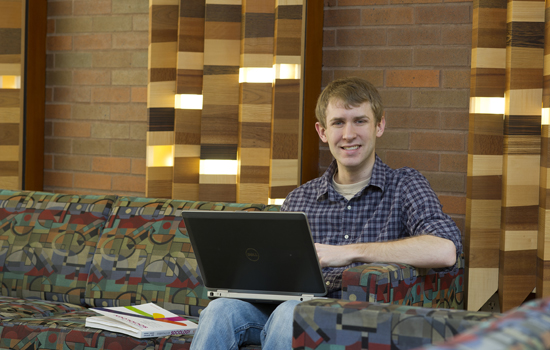NTID student ready to face future
A. Sue Weisler
Mason Chronister has always known he can accomplish anything despite his hearing and vision loss. At the end of May, he’ll achieve one dream of working for the government.
Mason Chronister carefully files away colorful memories of people he has met, places he has traveled, unforgettable experiences he’s had. As he faces his bright future, Chronister is anticipating making memories in a new way as he copes with the gradual loss of his vision.
Chronister, who will soon earn his Associate in Applied Science degree in administrative support technology from RIT’s National Technical Institute for the Deaf, has Usher Syndrome, a rare genetic condition resulting in a combination of hearing loss and slow-developing visual impairment that causes night blindness, loss of peripheral vision, and ultimately, complete vision loss. About four people in every 100,000 are diagnosed with the incurable condition.
“I was born deaf to hearing parents and attended mainstream schools,” said Chronister, from Red Lion, Pa. “I didn’t start noticing the effects of Usher Syndrome until I was about 14 years old. As time has gone on, it’s gotten worse. Today, I’m not able to see at night and my peripheral vision is so limited that I can’t see objects in my walking path. Sometimes I look clumsy because my balance has been affected. But despite all of my challenges, I’ve always known that I can accomplish anything—including realizing my dream of one day working for the government.”
In many ways, Chronister is not unlike so many other successful RIT graduates. He currently carries a 3.34 GPA and is a certified Microsoft specialist in Word, Excel, Access and PowerPoint, and he plans to enter the workforce just weeks after crossing the commencement stage. At the end of May, he will use his skills as an administrative professional with the Defense Logistics Agency, a branch of the U.S. Department of Defense located about an hour away from his home in Pennsylvania. In fact, this is Chronister’s second “tour of duty” with the agency. A successful co-op assignment last year helped secure permanent employment.
“I’ve always been fascinated by government—how it operates and how it impacts people’s lives,” he said. “Although I’m deaf and have limited vision, I’m able to work with my supervisor and co-workers to expertly execute my job, which includes documenting sensitive military information.”
Further filling his mental “memory book,” Chronister was the first RIT student with Usher Syndrome to study abroad in Italy, taking in the sights of Rome, Florence, Vatican City and Siena. He has also traveled extensively throughout the United States, visiting one of his favorite spots, San Francisco, where he actually hugged a part of the Golden Gate Bridge.
“Yes, I hugged it,” he laughed. “And I hugged a column in the Roman Colosseum, too. When I see something famous, it’s what I do. It’s like it helps me commit it to memory and it literally helps put me in touch with these fascinating objects.”
Back at NTID, Chronister has performed small roles in theatrical productions including Damn Yankees! and Hairspray.
“It’s challenging for me to participate in theater because of the dramatic lighting and the many stage props in my path,” he said. “It’s a true team effort—from our director to the other deaf and hearing actors and interpreters—to be sure that everything comes together and works out for me. I saw another student with Usher Syndrome participate in the theater, and that really inspired me. And my participation seems to have inspired others to join in,” he said.
Those who know Chronister well say that he is destined to live a great life.
“Mason is awesomely intriguing,” said Jonathan Holmes, his employment adviser at NTID. “He is unafraid to step into vulnerability and embrace his own authenticity. Being around him is truly a breath of fresh air and inspires me to be better in my work and in life. He brings light to everyone that he comes into contact with and has a very keen understanding of life. Mason is one of the few individuals I have ever encountered that has found the secret of living an honest and fulfilling life at such a young age.”
“No one knows what the future holds,” Chronister adds. “Every day they are making strides in the medical field and I continue to keep my strong faith. With the support of my family and friends, I refuse to let my loss of vision and hearing prevent me from doing everything I want to do. I refuse to set up barriers for my own success.”










